Best 75-inch TVs of 2024: Tested and reviewed
Go bigger and better with the best 75-inch TVs (and some great 77-inch TVs too)
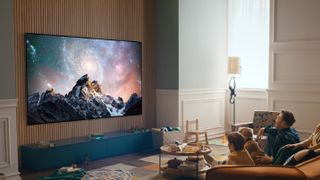
1. The list in brief
2. Best 75-inch TV
3. Best OLEDTV
4. Best value TV
5. Best gaming TV
6. Best QLED TV
7. Best Mini-LED TV
8. How to choose
9. How we test
The best 75-inch TVs are those that leverage some of the most unique features on the market at the perfect screen real estate. If 75-inch isn't enough for you, there's always the best 85-inch TVs to consider, or even the best 65-inch TVs if those larger than life screen are too much for your needs.
With years of experience covering TVs, streaming devices, projectors, and PC monitors, we certainly know a thing or two about what makes the perfect screen tick. We put these TVs to the test, challenging everything from price and performance to the underlying display technologies and AI capabilities that make them so sought after.
There's no question that the Hisense U8N Mini-LED TV embodies this mold as our top pick among the best 75-inch TVs due to its immense superiority in brightness, price, and interface. It also helps that the Hisense U8N is a gaming beast with several of the best specs that make it an ideal choice for PS5, Xbox Series X, and even PC gamers.
Just viewing general entertainment isn't enough when it comes to TVs anymore, as everything from music to gaming are proving just as important as everyone's favorite movies and TV shows. That means audio is also of the utmost importance, as well as the number of HDMI 2.1 inputs, and general accessibility. These several options among the best 75-inch TVs ensure you get that large image with ample performance.
The quick list
Here's a quick overview of the best 75-inch TVs you can buy right now based on our testing and reviews. And keep up on scrolling if you want to see our in-depth analysis of all the top TVs for every budget.
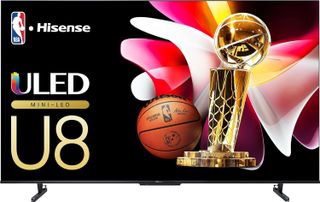
The best 75-inch TV
The Hisense U8N Mini-LED TV is one of the most vibrant TVs we’ve tested and outputs incredible brightness for its price point. Plus there's more than enough gaming feature to go around, as the U8N offers great performance for the price.
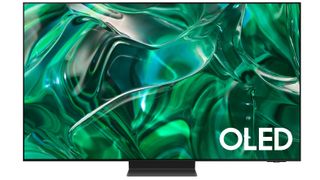
Samsung's second QD-OLED is its best TV
The Samsung S95C OLED is a huge and truly wonderful big-screen TV. At 77 inches, this QD-OLED has fantastic specs and performed incredibly well in our tests. It's on the expensive side, but it's this year's best 75-inch TV.
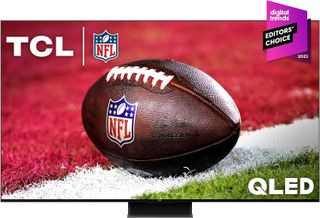
The best value TV
TCL's QM8 Mini-LED TV is a worthy upgrade for the entertainment space at 75-inch. It leverages a 120HZ refresh rate on top of myriad gaming features that will keep you in the zone, not to mention brightness performance that knocks glare out of the equation.
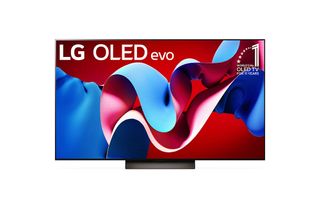
The best gaming TV
There's no denying just how much the LG C4 OLED stands as the perfect TV at the perfect price. HDR content pops while gaming is at its most extreme on this easy addition among the best 75-inch TVs.
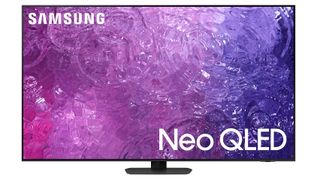
The best QLED TV you can buy
The Samsung QN90C Neo QLED TV is the premium QLED TV to get. With best-in-class brightness built on a clever design with every feature you need from a smart TV, the QN90C is tough to beat.
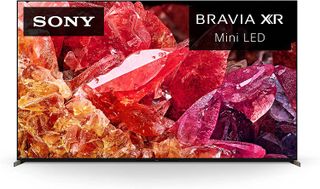
The best Mini-LED TV
The Sony Bravia X95K Mini LED TV is our top pick from Sony. It has the HDR performance you crave on movie night, pairing the set’s high luminance and targeted backlight control with plenty of nuance and practical vibrancy.
Best 75-inch TV
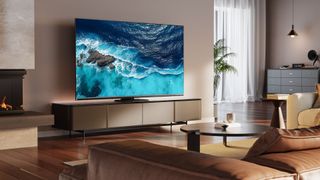
Specifications
Reasons to buy
Reasons to avoid
Taking up after last year's U8K (which we also adored for many of the same reasons), the new Hisense U8N Mini-LED TV proves to be a stunner for several underlying facets, namely an expert price to performance ratio. For just $2,000, slashed typically down to as low as $1,500 when on sale, the U8N makes itself known as a worthwhile investment with loads of potential.
While it only comes equipped with two HDMI 2.1 ports, it makes up for this slight with a 144Hz refresh rate and support for both FreeSync and G-Sync. You'll also be gaming at breakneck speeds like the rest of them thanks to a 13.1ms input latency, which could be lower but is at an acceptable range for most gamers.
This makes the Hisense U8N one of the most brilliant gaming TVs, especially for those running newer consoles like the PS5 and Xbox Series X. You'll also be pleased to note that the U8N has some of the highest brightness specs we've ever tested, with a phenomenally high HDR brightness of around 3,400 nits.
On that same note, you can expect the U8N to coral all of the necessary HDR formats, including Dolby Vision, HDR10+, HDR10, and even HLG. Dolby Atmos also ensures you get clear and crisp audio in content that supports it, but the addition of a 2.1.2 surround sound speaker built on a 60W rating is also quite impressive in an industry plagued with second-thought audio solutions.
Read our full Hisense U8N Mini-LED Google TV review.
Best OLED TV
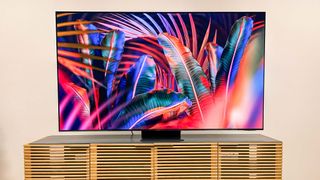

Specifications
Reasons to buy
Reasons to avoid
The Samsung S95C OLED remains the king in the OLED domain among best 75-inch TVs and it shows. You might be paying into quite the premium, given its meteoric $3,599 price point, but with it you're generating serious gains in your home cinema experience, namely the highly praised One Connect box for wireless TV connectivity.
Samsung's also no stranger to impeccable gaming. Through its onboard Game Bar 3.0, you can expect to play cloud gaming thanks to Xbox and Nvidia GeForce Now integrations. It's made all the better if you own a next-gen system, like the Xbox Series X, as you'll be able to hit 4K/120fps via its four total HDMI 2.1 inputs and the 9.2ms of input lag means you're staying well ahead of the curve.
The Samsung S95C is one of the very few TVs we've gifted a perfect score, and rightfully so. Unlike many other models, beyond just the 75-inch range, the S95C sports incredible audio thanks to its immersive 70W speaker built on a 4.2.2 channel system.
Read our full Samsung S95C OLED review.
The best value TV
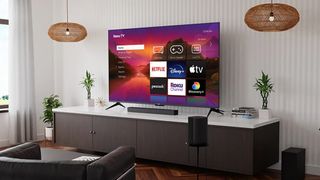
Specifications
Reasons to buy
Reasons to avoid
As among the best 75-inch TVs, the TCL QM8 Mini-LED TV makes itself known by casting a wide gamut through stellar brightness, gaming specs, and an interface led by none other than Google. With a 120Hz refresh rate and all the necessary screen tearing technologies, you won't be left in the dust when playing fast-paced shooters like Call of Duty: Warzone.
The QM8's Mini-LEDs also ensure you get the best possible blend of blacks and color where necessary. Measured by our trusted testers, it sports a Delta-E of 3.2, which directly relates to its color accuracy. making its vibrancy pop for animated content like the Mario Movie and beyond. Plus, both standard and HDR brightness are remarkable at 1,348 nits and 2,201 nits, respectively. Glare be gone!
In tandem with being among the best 75-inch TVs, the QM8 is also marked as one of the best TVs under $1,000. It's an easy pick for those looking to get a phenomenal image at a steep value.
Read our full TCL QM8 Mini-LED TV review.
The best TV for gaming
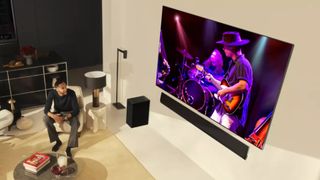
Specifications
Reasons to buy
Reasons to avoid
There's no denying that the new LG C4 OLED is a masterclass performer, one that brings the specs at a value that suits most TV buyers. It's easily slotted in as one of the best TVs despite only just releasing several months prior, showing promise in everything from its HDR output to gaming chops.
Though the LG C4 might slouch in its SDR brightness, hitting a peak of just 296 nits, it makes up for that in a high 1,049 nits of HDR brightness. An input lag of just 9.2ms while using Game Boost also keeps gamers in the head of the action, ensuring you never miss a beat even in those fast-paced experiences like Armored Core 6.
It also sports relatively high color accuracy with a Delta-E of just 1.8201. This ensures all of your favorite animated content looks just as good as the conventional movies and shows. All built on an OLED panel, the LG C4 is an absolute must-have aided in its abilities thanks to LG's proprietary webOS interface.
Read our full LG C4 OLED review.
The best QLED TV
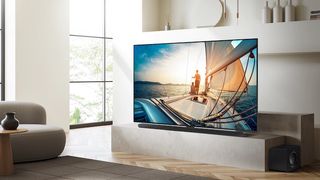

Specifications
Reasons to buy
Reasons to avoid
Given the wide praise given its S95C OLED offshoot, it should come as no surprise that the Samsung QN90C QLED TV is a stellar option at the 75-inch range. Given that it is among the best 75-inch TVs, don't expect it to come cheap though, as pricing will usually sit around $2,199.
At least you're getting quite the tech stack on that sticker price, with a Delta-E at 2.2 and a Rec709 Gamut at 99.77, meaning colors are vibrant and lifelike as ever. HDR performance is also not too shabby on the QN90C, which can hit a peak HDR luminesce of 1,987 nits, and colors still look crisp thanks to a UHDA-P3 gamut of 95.81.
The QN90C uses a 120Hz refresh rate, meaning gaming will still be just as stellar on this display. Plus, the inclusion of an ATSC 3.0 Tuner means you gain access to NextGen TV, if that's your cup of tea. Audio is also a real banger thanks to the 60W speaker built on a 4.2.2 channel system, so everything from Michael Bay explosions to the squeaking of Ratatouille will be bombastic as they are crisp.
Read our full Samsung QN90C Neo QLED TV review or browse our Samsung promo codes
The best Mini-LED TV
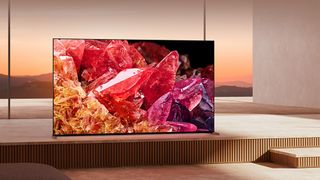
Specifications
Reasons to buy
Reasons to avoid
For those looking to get a killer Mini-LED model among the best 75-inch TVs, the Sony Bravia X95K Mini-LED TV is the way to go. It uses Google TV as its main interface, making setup and content curation an absolute breeze.
While it's certainly no gamer's paradise, due to an 18.3ms of input lag, the X95K does come equipped with some PlayStation 5 specific features, including Auto Genre Mode and Auto HDR Tone Mapping. Inclusions like VRR and ALLM also round out the gaming enhancements that make it a suitable 75-inch TV for gamers.
Brightness was truly remarkable on the X95K, which can see as high as 1,600 nits in a 10 percent window. It uses Sony's Cognitive Processor XR for stellar HDR coverage and color volumes that truly pop, best of all witnessed on that sweet 75-inch screen size.
You'll be paying a hefty premium for the 75-inch model, which is listed at $3,799. It's a bit pricey, but makes sense for what you're getting. Its 60W speaker makes all the difference, especially in the midst of Final Fantasy VII Rebirth with its remarkable soundtrack.
Read our full Sony Bravia X95K Mini LED TV review.
TV benchmarks: comparison
| TV | Peak Brightness (tested) | Delta-E (tested) | DCI-P3 Color Volume (tested) | Input Lag (tested) |
| Samsung S95C OLED | 1086.381 nits | 1.3184 | 108.03% | 9.2ms |
| Samsung QN90C QLED TV | 1987.344 nits | 2.2404 | 95.81% | 9.7ms |
| Roku Plus Series | 648.104 nits | 2.6011 | 95.8% | 11.5ms |
| LG C3 OLED | 824.950 nits | 1.3908 | 98.72% | 9.1ms |
| Hisense U8K ULED TV | 2004.59 nits | 4.4614 | 97.82% | 13.2ms |
| Sony Bravia X95K | 1400 nits | 1.8766 | 95.89% | 18.3ms |
Frequently asked questions
How do I choose the best 75-inch TV for me?
Knowing what size you want helps in selecting a great TV, but not all 75-inch TVs are the same. Here are some of the other factors to consider when picking the best 75-inch TV for your home.
Size: First, decide if you’re locked into an 75-inch model. You’ll find more options in 65-inch models and often better values, or you can go bigger with an 85-inch TV.
And remember to fit the TV to the room it's in. For an 75-inch 4K TV, you'll be dealing with a TV that measures at least 65 inches across, and you'll want to be sitting more than 6 feet from the set to get a good viewing experience. (Learn more in our article What size TV should you buy?)
Price: Big screens usually mean big prices, so know your budget, and recognize that you may need to spend a little more to get a better TV. The most affordable 75-inch TVs range between $800 and $1,200, but the majority will be more expensive, between $2,000 and $4,000 for the most premium models. The differences in price may impact other features and the performance of the TV, but you still want to get the best TV for your money. If your budget is strict but you can't settle for performance niggles, consider an older premium TV. You can usually get great deals on them.
Display: There are several different types of display offered on today's TVs, from the most basic LCD panels to QLED panels of various degrees of refinement, and (the best option) OLED. The better the panel, the more expensive the TV, but you definitely want something that delivers a wide color gamut, high color accuracy and strong brightness. Our reviews detail the individual performance of each set, including the results of lab testing those key qualities.
HDR support: If you want the most colors, get one of the HDR sets with Dolby Vision compatibility above. This technology is able to deliver more colors, more contrast levels and increased brightness. It could make a set a bit more costly, but it guarantees you’ll still be satisfied with TV as the Dolby Vision format seems to be gaining momentum.
Ports: Another thing to consider is port offerings. Some of the sets above sport 3 HDMI ports, while some have 4. In general, more ports is better, especially if you have a collection of input devices like soundbars or game consoles.
Smart features: All of the TVs on this list are smart TVs, but different brands and smart TV software will have a different ecosystem of apps to choose from and offer a different collection of smart features, like voice interaction and smart home compatibility. Check out our individual reviews to see a discussion of what each TV brings to the table in terms of features and smart capabilities.
How we test the best 75-inch TVs
How we test the best 75-inch TVs
Why you can trust Tom's Guide
When it comes to evaluating TVs, we're serious about getting it right. That's why every TV we review is put through a rigorous testing process that measures key standards of picture quality and performance.
Our lab tests involve testing for color accuracy and color gamut using an X-Rite i1 Pro spectrophotometer, an AccuPel DVG-5000 video test pattern generator and SpectraCal CalMAN Ultimate calibration software. These tools are relied on by professional calibrators throughout the industry, and we've paired them with custom workflows to gather the information needed for our reviews. These measurements are taken first in standard mode to simulate the average watching experience, and then taken again in other display modes to find the top color and brightness performance offered by each set.
Our testing measures contrast and maximum brightness, as well as lag time. Using a Leo Bodnar Video Signal Input Lag Tester to test video signal delay, we time how long it takes for content to travel from the original video source to the screen, measured to the millisecond. Shorter response times equate with faster gaming performance, letting us objectively know which TVs are better for gaming.
We use all of these objective test results to make comparisons about quality and performance between different TVs, but our evaluation doesn't end there. We also spend hours with each set, watching shows and movies, and using carefully selected video samples to highlight the strengths and weaknesses of each set and help us tell you which TVs look and sound the best in a real home viewing environment.
And there's more to today's TVs than just viewing, so we also check out the smart TV functions and evaluate everything from the interface to the remote control design. This lets our reviews speak to the technical capabilities of today's smart TVs and how they fit into your connected home.
How far should I sit from a 75-inch 4K TV?
For optimal viewing, we recommend sitting around 8 to 9 feet away. You can sit further back if you have the luxury of a larger room but you might start to miss out on the extra detail that a good 4K TV pulls out.
You can read more in-depth details in our article What screen size should you buy .
Check out our favorites and top picks for the best TVs in every style, size and price range.
Best TVs | Best 4K TVs | Best smart TVs for streaming | Best TVs for gaming
The best TVs under $1000 | The best TVs under $500
Best TV brands | Best Samsung TVs | Best TCL TVs | Best LG TVs | Best Roku TVs | Best OLED TVs | Best QLED TVs | Best 8K TVs | Best HDMI 2.1 TV | Best TVs with ATSC 3.0 | Best TVs with Chromecast
The smallest smart TVs | Best 43-inch TVs | Best 50-inch TVs | Best 55-inch TVs | Best 65-inch TVs | Best 70-inch TVs | Best 75-inch TVs | Best 85-inch TVs
And don't forget to watch out for the latest TV reviews.
Get the top Amazon Prime Day deals right in your inbox: Sign up now!
Receive the hottest deals and product recommendations alongside the biggest tech news from the Tom's Guide team straight to your inbox!

Ryan Epps is a Staff Writer under the TV/AV section at Tom's Guide focusing on TVs and projectors. When not researching PHOLEDs and writing about the next major innovation in the projector space, he's consuming random anime from the 90's, playing Dark Souls 3 again, or reading yet another Haruki Murakami novel.
- Nick PinoManaging Editor, TV and AV
-
RG Geiger I got the Hisense 75 inch tv and it's sweet. It's also my first smart tv. I have used a dozen different black boxes and toggles over the years. I wasn't impressed with the implementation of Android TV so I have installed Google tv and it's better. The remote is horrible, sticky d-pad, slow, way to many buttons. I have a programmable remote and the difference in button speed is very noticeable. Love the picture and ample sound from the tv speakers. Here's a picture.Reply
a/1tFYKlE -
SirJynx Reply
This is a terrible article. Did you really take an article from 2021, relabel it as 2024, and leave in old tvs? Your best mini led tv pick for 2024 is a 3 year old Sony, really?! I'm blocking this site from appearing on my feeds in the future. Incredibly lazy and low effort.admin said:The best 75-inch TVs offer big screens, great features and top-notch performance, in addition to a better viewing experience.
Best 75-inch TVs: Read more